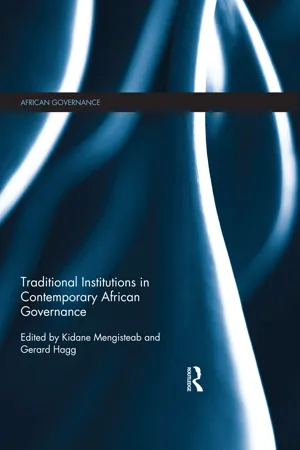
Traditional Institutions in Contemporary African Governance
- 236 pages
- English
- ePUB (mobile friendly)
- Available on iOS & Android
Traditional Institutions in Contemporary African Governance
About This Book
Most African economies range from moderately advanced capitalist systems with modern banks and stock markets to peasant and pastoral subsistent systems. Most African countries are also characterized by parallel institutions of governance – one is the state sanctioned (formal) system and the other is the traditional system, which is adhered to, primarily but not exclusively, by the segments of the population in the subsistence peasant and pastoral economic systems.
Traditional Institutions in Contemporary African Governance examines critical issues that are largely neglected in the literature, including why traditional institutions have remained entrenched, what the socioeconomic implications of fragmented institutional systems are, and whether they facilitate or impede democratization. The contributors investigate the organizational structure of traditional leadership, the level of adherence of the traditional systems, how dispute resolution, decision-making, and resource allocation are conducted in the traditional system, gender relations in the traditional system, and how the traditional institutions interact with the formal institutions.
Filling a conspicuous gap in the literature on African governance, this book will be of great interest to policy makers as well as students and scholars of African politics, political economy and democratization.
Frequently asked questions
Information
Table of contents
- Cover
- Title
- Copyright
- Contents
- List of figures
- List of tables
- Notes on contributors
- 1 Institutional fragmentation in Africa and its implications
- 2 Leadership structures and adherence levels of traditional institutions
- 3 Traditional institutions of governance in a democratic South Africa
- 4 Traditional institutions of the Booranaa and the Nuer in Ethiopia
- 5 Traditional institutions in Somaliland
- 6 Traditional institutions of the Gurage people
- 7 Traditional institutions of the Meru, Pokot, and Mijikenda communities in Kenya
- 8 Eritrea’s experience in reconciling the formal and traditional institutions in its judicial system
- 9 The relevance of Lesotho’s chieftainship system to contemporary governance
- 10 “Civil chieftaincy” in African governance
- 11 Relevance of traditional institutions and how they might be reconciled with the formal institutions
- 12 Conclusion: lessons learned and policy implications
- Bibliography
- Index